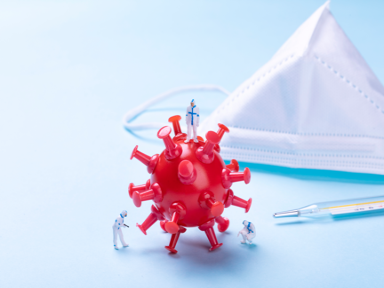prnewswireJuly 12, 2021
Tag: COVID-19 , vaccine , SARS-CoV-2
The commercial outlook for COVID-19 therapeutics is expected to decline progressively throughout 2021 due to the phased implementation of global vaccination programs, which should substantially reduce both outpatient and hospital COVID-19 cases.
Indeed, several vaccines being developed by Moderna, Pfizer/BioNTech, AstraZeneca, Novavax, and Johnson & Johnson have shown 66-95% effectiveness against symptomatic COVID-19 illness, and are also highly effective against COVID-19 hospitalization, though the potential emergence of new SARS-CoV-2 variants which may impair the effectiveness of vaccines against mild/moderate infections could partially revitalize the prospects for therapeutics aimed at the outpatient setting.
Veklury (remdesivir) is the first and only approved antiviral for the treatment of hospitalized COVID-19 patients in the US, and has been rapidly adopted as the global standard of care for moderate and severe patients since its initial US Emergency Use Authorization (EUA) in May 2020 (full approval occurred in October 2020).
Veklury's rapid commercial success ($2.8bn in sales in 2020) has been driven by positive results from the US National Institutes of Health (NIH)-sponsored ACTT-1 study, which showed the drug significantly reduced the duration of hospitalization compared to placebo in patients with moderate-severe COVID-19 pneumonia.

While negative results from the World Health Organization's (WHO's) SOLIDARITY trial in October 2020 contradicted these initial findings, suggesting that Veklury does not significantly reduce the duration of hospitalization or the risk of mortality in hospitalized patients, and resulting in the WHO recommending against its use, demand nevertheless increased in Q4.
Indeed, in January 2021, Gilead noted that 50-60% of hospitalized US patients were being treated with remdesivir versus ~30% in October 2020, likely due to a lack of alternative options, thus the publisher expects the brunt of the impact of the WHO's negative recommendation will only be felt once alternative agents become available for hospitalized patients.
Veklury faces myriad threats from pipeline candidates, including antivirals, immunomodulatory agents, monoclonal antibodies, and hyperimmune globulin therapies. Oral antivirals pose a particular threat, given that their similar mode of action means they are likely to produce comparable results in ongoing trials (or superior results if optimized for greater potency against the SARS-CoV-2 RNA polymerase), and their administration route would be more convenient than Veklury's IV formulation.
Favipiravir is the nearest-term threat, with emergency approvals in India and Russia, and ongoing studies in the outpatient, hospital, and prophylaxis settings, though disappointing results from a study in hospitalized patients in Kuwait suggest favipiravir's use will be limited to outpatients.
The overall likelihood of approval of a Phase I antiviral asset is 12.9%, and the average probability a drug advances from Phase III is 68.5%. Antiviral assets, on average, take 8.4 years from Phase I to approval, slightly shorter than the average of 9.0 years for all infectious disease assets. However, in the case of COVID-19, development periods have been shortened substantially to as little as 6-9 months as repurposed agents have been rushed through clinical trials and granted rapid reviews by regulators.
Pivotal trial data for a huge range of repurposed drugs are expected in H1 2021, including from Olumiant's COV-BARRIER study evaluating the drug as a monotherapy against standard of care, and favipiravir's PRESECO study evaluating its ability to prevent progression to severe infection in outpatients with mild-moderate infections.


Contact Us
Tel: (+86) 400 610 1188
WhatsApp/Telegram/Wechat: +86 13621645194
+86 15021993094
Follow Us:




 Pharma Sources Insight July 2025
Pharma Sources Insight July 2025


